|
There are a few times in my cinemagoing life that I've been well and truly wowed by something. Richard Kelly's debut, Donnie Darko, is one of the films to make that list. Being a child of the late eighties and a teenager in the nineties, most of these "wow" moments were connected to technological developments, like CGI. I love Pixar animations, and the effects created by Industrial Light and Magic. Sometimes, though, the story and construction alone were able to make me sit back and take notice, like Christopher Nolan's Memento or Spike Jonze's Adaptation. While ILM and Pixar play with how to present the filmic world, Kelly, Nolan and Jonze play with how we perceive the filmic world.
That 'play' as I've dubbed it, is probably how Richard Kelly began to think when putting fingers to keys to bring teenager Donnie Darko (Jake Gyllenhaal) and his family, sisters Elizabeth (Maggie Gyllenhaal, Jake's real-life sister) and Samantha (Daveigh Chase, who reprises her role in the rather lacklustre Chris Fisher-helmed sequel, S. Darko) and long-suffering parents Rose (Mary McDonnell) and Eddie (Holmes Osbourne) to life. With fire in their bellies, all new directors aspire to achieve something different or, to use a sci-fi colloquialism that Kelly himself may like, to "boldly go, where no man has gone before."
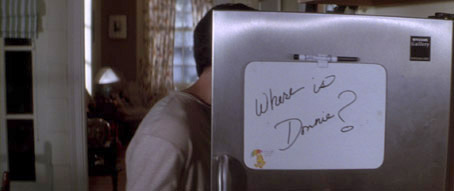
Instead of sending a man on this mission, Kelly sends a boy. Donnie. He's an ordinary teenage boy, average even. Like most kids at seventeen, he's confused. Searching for his identity and place in the world, he lashes out at those around him, and his troubled past has landed him in therapy with Dr. Lillian Thurman (Katherine Ross), medicated to keep his behaviour under control. Something of a repressed free spirit, he's trapped in suburban Middlesex (reputedly doubling for the Virginian city where Kelly grew up), plagued by a sleeping disorder that makes him sleepwalk, with no recollection of where he's been. Everything changes the night Frank the bunny rabbit (James Duval) comes to him in a vision, saving him from a premature death when a jet engine falls from the sky and crashes into the Darko home.
That's not the end of Donnie's troubles. If it were, Donnie Darko would be a very short film indeed. The end, as they say, has a start.
Safely outside his bedroom, the kindly-voiced Frank (a nice touch from Kelly, since from the trailer, I'd expected him to sound rather demonic) imparts that the world will end 28 days, 6 hours, 42 minutes and 12 seconds. If you thought that the jet engine was Donnie's spider bite, then the countdown to world's end is most definitely his kryptonite. The phrase insummountable odds could have been invented for this young man. Over time, Frank returns to him, giving clues and missions to help him find the answers and save who he loves, helped by his therapist and teachers, Karen Pomeroy (Drew Barrymore) and Dr Kenneth Monnitoff (Noah Wyle). Along the way, he crosses swords with Kitty Farmer (Beth Grant), another member of the faculty, who is much enamoured with the teachings of motivational guru Jim Cunningham (Patrick Swayze). Like all good superhero tales, he does get the girl. Sweet-natured Gretchen Ross (Jenna Malone), a new arrival in Middlesex, is the only person he really opens up to and places trust in.
Even that rather fantastical take on events doesn't really cover what unfolds, but, fittingly, this isn't a film which is neat, linear or provides answers in any way, unless, like Donnie, you look for them. This film has to be viewed with the most open of minds, and to unpack it any further than this would severely compromise your experience and enjoyment of it. Simply put, there is no single interpretations of what Donnie Darko means, because it means different things to different people.
How you perceive Donnie the boy greatly affects the way you see Donnie the film.
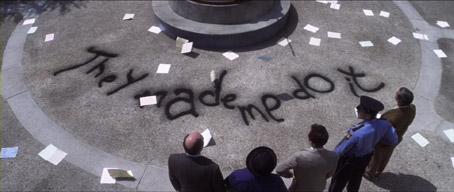
When discussing the film after seeing it for the first time, a friend of mine was firm in the belief that Donnie was mad or a schizophrenic, so it made it hard to believe what we saw or take anything he sees as truth. Though I've never subscribed to that school of thought – it's a neat catch-all to explain the unexplainable, much like the teaching of Jim Cunningham give the reglious Kitty Farmer something to cling to – it's a useful way to consider the film's style and structure. It does feel fluid and dream-like, and though Frank's first appearance is something of a shock, we, like Donnie come to anticipate and even embrace his presence. I don't feel it's a coincidence, that the closer Donnie gets to that all-ellusive truth, the stranger the information he learns becomes.
I dislike using the word 'clever' in relation to a film because that brings about discussions of elitism, but Donnie Darko is a clever film, one which is complex, multi-layered, intriguing and immensely rewarding. I'll be honest here and state that I still don't fully understand it, and I don't thnk I ever will. Does my lack of knowledge matter? No it doesn't.
Donnie Darko is unique – yes, I mean that – in creating a world that feels authentic and ordinary, whilst embracing, seemlessly, elements of the supernatural. It feels odd to call this a 'period' film but I honestly felt like I was watching a film from that late eighties period. It doesn't just mimic or mildly evokwe it's timeframe, it immerses itself in it – in music choices in particular, Kelly excells – so much so that it felt like watching the fantasy films I grew up on like Jim Henson's Labyrinth, Wolfgang Petersen's Neverending Story and Randal Kleiser's Flight of the Navigator. In my mind at least, Donnie can happily sit with Sarah, Bastien and David and I wouldn't question it. At no time did I think I was watching a film made in post-millennial California. Coincidentally, all those films left my young self "wowed" too.
If you're hankering for my interpretation, here it is: for me, this is a film which presents broad themes – love, fear, life, death, logic and chaos – in a deeply personal way. It's about the fight between those polarities and the balance we can achieve for ourselves. Like all superheroes, Donnie is part angel, part devil, all rebel, and it's his fight which makes this film such a memorable and satisfying experience.
Even the culmination of Donnie's quest leaves things open to debate. Did he succeed or did he fail? In the case of Richard Kelly, few would argue that he did achieve the impossible in creating a debut feature that's genuinely different. Though many try in that endeavour, all too few succeed. Kelly is a rare exception. It's so rare a feat in fact, you could argue that he's never reached the same creative heights since. His second feature, Southland Tales, like Darko, is an acquired taste, much-maligned, oft-misunderstood, while it's follow-up, The Box, left me rather mystified for different reasons – and they weren't the good kind. In many ways, Kelly is a victim of his own success, when you start with something as good as Donnie Darko, there isn't a great margin for error. I still hope that one day, Kelly will rediscover his form, and prove that lightening can strike twice. Until then, he should be satisfied that his debut feature has left such an important, perhaps indelible mark in contemporary cinema history.
Often, when different cuts of a film are made available, preference is always given to the director's cut over its theatrical cousin, because there's greater cachet in liking it, and it's often promoted as definitive. I've always thought it goes back to The Great Man theory, which sees the director's role and vision as paramount, and it's a school of thought that definitely sticks, especially when it comes to marketing.
Interestingly, in the case of Donnie Darko, it really comes down to personal choice. As evidenced in his commentary on disc two (discussed below), even Kelly is reluctant to label the Director's Cut in any significant way, and doesn't once state which one he favours – a rather common trait these days, maybe some directors believe in The Great Man theory too.
The Director's Cut extends the film by twenty minutes (the original runs for one hour and fifty-three minutes, while this clocks in at two-hours, thirteen minutes). On the face of it, twenty minutes sounds like a lot, but in reality, the addition comes from the cumulative weight of small scenes slipped in here and there (some are as small as a few seconds) which extend existing scenes.
I've seen both cuts a numbers of times – admittedly, it's been a few years since I've seen either version – so the differences, for myself at least, have become harder to discern. In many ways, it's like watching your mind play tricks on you, because you're aware that things are different, but you're not quite sure why (especially if you watch the cuts close together, as I have to write this piece). In terms of visual material, the changes Kelly implements are, on the whole, subtle, rather than significant. That said, the extra material does take the pace of the film down a notch, and though this may be indicative of my lack of concentration and patience, I really felt it.
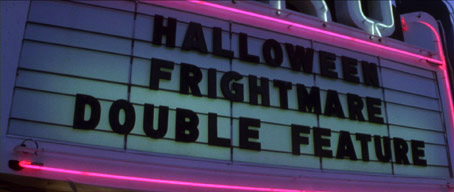
For those with keen ears and good memories, the rest of the changes come in the form of music swaps or other soundtrack alterations. In the case of the former, this is most obvious in the switch during the opening sequence, as Donnie rides his bike home, which trades in Echo and the Bunnymen's 'The Killing Moon' for INXS' 'Never Tear Us Apart' (Kelly notes in his commentary tracks that clearance rights for this song in particular were too expensive at the time of the film's release). For the latter, there are instances where the soundtrack is tweaked to reduce (thus making dialogue clearer) or extend the presence of music (as in scene where Donnie's father drives him to therapy, and the radio plays in the background, which is extended throughout the scene).
In a broader sense, the Director's Cut is, for me, structurally speaking, Darko-by-numbers. Though it retains the fluid, almost dreamlike quality of the Theatrical Cut, each segment of the story is prefaced by an intertitles-turned overlays taken from Roberta Sparrow's The Philosophy of Time, which relates to the events we're about to see. The chapterising is a neat touch, and it does make the film that bit more intelligible, since the correlation between the book and the narrative is that much closer. This not only makes Donnie's actions clearer, but also justifies them, changing him from a confused young man into a prophet/superhero swings the film into science fiction territory – Kelly freely admits he sees the film in that light – which takes away somewhat from Donnie's ordinariness, and the suburban honesty and realism Donnie Darko is steeped in.
Though the longer cut is interesting to watch, overall, I still prefer the Theatrical Cut, since it retains that wonderful, mysterious quality – who wants resolution and neatness, it's rather boring? – I like to be challenged by films, to ponder and destruct, and this cut of the film gives it in spades. Kelly has since described his cut as 'indulgent,' and I think it's a fitting description since, as the director's cut label implies, this is Donnie Darko through his eyes, and in getting a second shot at showing us his creation, he certainly shows off a little bit. Mind you, when it's so good to begin with – before the tinkering – who can blame him?
If you already own the Donnie Darko theatrical cut and director's cut on DVD then this will be your prime reason for upgrading to this new Blu-ray edition. Unfortunately it's also the element of the disc that's most likely to disappoint. My initial suspicion was that the film was actually shot on Super-16 for budgetary reasons, but reaseach confirms that Kodak Vision 800T 5289 35mm was the shooting format, so we've every right to expect a pin-sharp picture with spot-on contrast, but that's not what we get. The results, it has to be said, vary quite a bit. It's not really clear from the caps here, but for much of the time the contrast is lacks punch and the black levels are weak, which is particularly evident in darker scenes and highlighted by the 2.35:1 aspect ratio, which gives you a pair of black borders for constant comparison. At other times, usually daylight or effects sequences, the contrast feels a little cranked up from the norm, losing a little detail at both ends of the range. The sharpness also varies quite dramatically, reaching a low point on the wide shot when Gretchen first enters Miss Pomery's classroom, where the detail is fuzzy enough to render her face as an indistinct pale blob. That said, the variance in contrast and sharpness does intermittently provide the results we'd hope for, notably during Jim Cunningham's horrible school seminar (Donnie's response to which is a film highlight), where sharpness, contrast and colour are all impressive and definitely an improvement on the DVD.
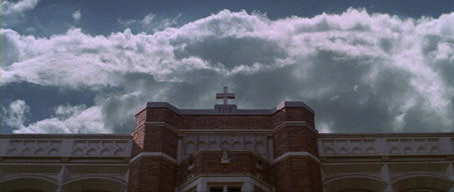
There's a choice between Dolby stereo 2.0 and DTS-HD 5.1 surround tracks, and again the latter doesn't provide the jump up from DVD you might be hoping for. Indeed, I'd go out on a limb and suggest that the track has not been remixed in any way, just re-encoded for DTS – the sound is a little more widely spread, but lacks the clarity, precision and punch of a true HD or even a strong Dolby 5.1 surround track. The music sounds pretty good on both, but once again, it's the Jim Cunningham seminar that fares best here. Maybe he really is the antichrist as Donnie suggests.
This one truly justifies the 'Ultimate Edition' tag, most certainly making use of the extra data capacity Blu-ray affords. In essence, that extra space allows for the supplemental material on the pre-existing theatrical and director's cut DVD releases to be brought together in one package (though not every last extra from these is ported across). There is indeed more here, but aside from some beautifully designed packaging and menu, in-keeping with the trailer used to promote the release and the upscale to Blu-ray, there's little else that's new.
Accessibility wise, the branch-style menu with various subsections e.g. 'behind the scenes' and 'promos' – with a nod to the anatomical drawings in The Philosophy of Time – is a little strange to get to grips with at first, but once you've navigated them a couple of times they get easier, and it is rather fitting given that nothing about this film is pedestrian. That said, Metrodome have treated the film and the marketing of it with an admirable attention to detail, and this latest release is no exception.
Disc One carries the original cut of the film along with the following supplements:
Feature Commentary with director Richard Kelly
Conducted with Kelly and lead actor Jake Gyllenhaal, this track has great potential, which, unfortunately, it doesn't entirely fulfil. Though they work well together, and Gyllenhaal gives some interesting comments in regard to his role and experiences on the shoot, his banter with Kelly tends to make the director lose focus and cause dead spots as he tries to gather his thoughts. There are other instances of quiet when it's clear they're watching the film at the same time, and amusingly, Gyllenhaal apologies at one point for doing just that.
In the case of the former interruption, while it's not the biggest of gripes at first, it does become more frustrating over time, since Kelly spends a fair amount of this track attempting to explain the very complex logic within and mythology surrounding the film, which means there are scene-specific moments, so it's not one for idle listening. As is obvious by now, with a story like Donnie Darko's, this is no easy task, and he doesn't quite manage to succeed. That said, it's great to get Kelly's perspective on the project, and I think it really adds to how the film can be appreciated and interpreted. Having sandwiched this between two viewings of the original cut, I can say that it certainly gave me a lot to think about and added a new level of enjoyment to the film, which, I'd suggest, is the primary reason why these commentaries are recorded in the first place.
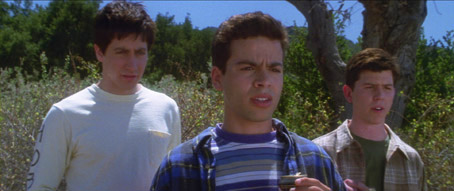
This may be greed talking – the more you get on a disc, the more you seem to want – but I would've loved to find a newly-recorded track on this, just to hear Kelly's thoughts on the project in the intervening years since its release. Granted, my request presents various logistical issues, but I can't help thinking it would have added something quite special to this package that would have made it a real draw for fans of the film and the director alike. A bit of a missed opportunity.
Feature Commentary with Cast and Crew
This one may win the prize for busiest commentary ever with ten participants all recorded at the same time, so it's like the audio equivalent of a press round table. Director Kelly is joined by producers Sean McKittrick and Nancy Juvonen, and cast members including Drew Barrymore, Mary McDonnell, Jena Malone, Holmes Osborne, Katharine Ross, James Duval and Beth Grant (who introduce themselves by character name, which is an amusing little touch).
As you'd expect, Kelly and Barrymore contribute the most, but everyone does get a chance to talk. This is less scene-specific than the first track, and quite freewheeling. The majority of the discussion centres on character and interpretation of the story as well as some information about shooting the film, which makes for an interesting and engaging listen. Inevitably there are moments where it descends into a mutual appreciation fest, and there are a lot of comments that begin with the words "wonderful" or "I love..." but that's to be expected. In fact, given how many people are present during the recording, if they weren't complimentary about each other I'd find it a little bit suspect.
Simply because there are so many voices on this track, it can get a bit overwhelming, but having listened to a fair few commentaries with less participants that were full of dead air as a result, I know which one I'd rather listen to. It also makes a nice change for a wider spectrum of cast members to be included, since it's often limited to the director and the leading man, as is true of the first commentary in this release.
From the sounds of this, they certainly had a lot of fun, and it's certainly a lively affair.
Behind the Scenes:
B-roll footage (04:00)
For aspiring filmmakers and fans everywhere, this edited selection of shooting footage shows that nothing has been left off this release, even something which has limited appeal like this.
Curious in the way that seeing film sets is always somewhat fascinating, they're worth a look for the novelty value of seeing and hearing the cast and crew at work, but not much else. Of all the extras they've chosen to port, this is probably the most questionable inclusion, and I can think of better substitutions. Dare I say this, but it feels like it's there just to fill up the disc and make it look like you're getting more than you actually are.
Cast and Crew Interviews (15:16)
The menu branch subdivides further here, allowing you to watch the interviews separately or play them all in one go. Shot during production (preceded by another disclaimer regarding footage quality) the contribution list is pretty comprehensive, with everyone from Richard Kelly, executive producers Henry Lowry and Casey La Scala to cast members Drew Barrymore (also an executive producer), Jake Gyllenhaal and Jenna Malone amongst others. Though brief and obviously culled from longer EPK material, they're still an important and early insight into their personal perceptions of, and reflections upon, the film before it's release, which is always interesting to look back on, especially from the perspective of stardom and the subsequent careers of all involved.
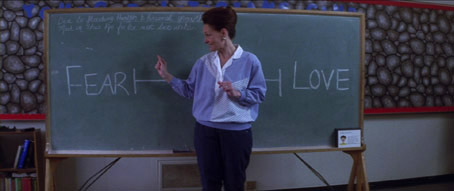
Additional Scenes (30:40)
Though somewhat redundant given the inclusion of the director's cut on disc two, which restores a fair number of them, it's still nice to have this collection of extra footage included outside of that. Ranging from under twenty seconds in length to over three minutes, they're presented as is, and vary in quality, since as you'd expect at this juncture in the film's life, they weren't graded to match the theatrical cut (a featurette concerned with that very process would have been a welcome addition). There are some great little moments here, especially the scenes with the Donnie, his sister Samantha and his classmates. As is common with additional material like this, most cuts were made for time, but they certainly flesh out areas of the narrative (too much, perhaps) and are fun to watch in their own right.
You can scroll through the list and view each scene on its own or view or all twenty consecutively via the 'play all' feature. In addition, the optional commentary is a nice touch, shedding light on his editing decisions and the film's many and varied referential details circa the initial DVD release.
They Made Me Do It [featurette] (04:48)
A short, informal behind-the-scenes type piece, shot on handheld camera (with some neat time-lapse editing) which follows the fourteen UK graffiti artists commissioned by Tom Grievson (then head of marketing at Metrodrome distribution) to create a canvas inspired by the film (in 6 hours, 42 minutes and 12 seconds). Their collected works formed an exhibit at the Dreambagsjaguarshoes bar in London for 28 days. Also included alongside the paintings, were murals and an interactive digital clock, which counted down the days of the exhibition's runtime, and the original rabbit mask belonging to the infamous Frank.
They Made Me Do It [art gallery] (03:11)
This slideshow depicts the work of the artists shown in the featurette discussed above. There's a real eclectic mix of styles here, and from pure enjoyment, it's intriguing to see how one film can inspire people and with such diverse results.
For those interested, more light on the process of bringing the artists together is shed by Grievson during the They Made Me Do It Too featurette on the second disc, which also shows some footage of the exhibition.
Promos:
As with the other material shown here, these can be viewed separately or together at once.
Cunning Visions Infomercials (5:42)
These commercials ('Controlling Fear' parts one and two) are full-length versions of the advertisements we see throughout the film, and they're a wonderful parody of those shown on late night television, and a frighteningly accurate one at that. They're so good in fact; they could very well be real. To play with that idea and get a little metareferential, you can watch these with another optional commentary provided by Cunning Visions CEO Linda Connie and informercial director Fabian Van Patten. I love touches like this, and it just goes to show the level of detail that has gone into creating Donnie's world; one that's incredibly easy to get lost in. As with all the best depictions of fantasy, there's a thread of reality running all the way through, and it's taken to a whole other level here, akin to the Lacuna Inc promotion materials for Michel Gondry's Eternal Sunshine of the Spotless Mind, created some three years later. Very clever stuff and a lot of fun.
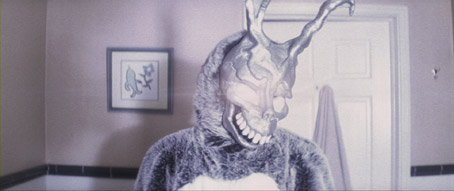
Original TV Spots (2:10)
One for the marketing fiends and completists alike. As the title implies, this shows the American Newmarket distribution TV spots used promote the film at the time of its release. Complete with gravelly-voiced narration, they all tie in nearly to the Halloween-based release date on both sides of the Atlantic (separated by a year and a few days) and the early pitching of it as a teen horror film. The first (0:17) of these focuses solely on the cast and is purely a visual role-call. The second (0:17) uses a neat little series of intertitles: 'dark', 'darker,' 'Darko' to explore aspects of the film. The third runs slightly longer (0:32) and is more like a trailer, giving a broader picture of the film as a whole, though it plays up the fear angle and repeats the 'dark,' 'darker,' Darko,' titling. The fourth (0:32), emphasises the presence of Frank, and Donnie's desire to save those around him. This time, tellingly, the title of the film is enough. The fifth and final spot (0:32), brings back the intertitles between clips, which act as a shorthand for the major themematic strands of the film: 'visions,' 'time travel,' 'sacrifice,' ending with the now iconic image of Frank.
Theatrical Trailer (2:22)
A slower-cut, lengthier piece, which plays up the teen angle with Donnie's quirkiness and the 'dark' elements of the film. Construction wise, it borrows the intertitle sets from the TV spots discussed above, tweaking them slightly to read 'dark,' darkest' 'Darko.' Though it gives a fairly good overview of the film, it's a very basic one. Then again, to depict all the layers of Donnie Darko would take considerably longer than the average trailer's runtime and give too much away. As such, it's clear that the editorial choices were made to combat both issues, and most importantly, appeal to the widest possible audience.
Given that just everything and the kitchen sink have been put into this release, it's unfortunate that the beautifully cut trailer created especially for it, is, inexplicably, absent. For those of you who haven't seen it, click here. Once you've watched it, I think you'll agree that it would have been lovely to see this in Blu-ray resolution.
The Philosophy of Time Travel (3:12)
A fun little thing this, purely here for novelty value, which presents an aged CGI version of Roberta Sparrow's book, in animated form, with readable text excerpts.
Disc Two carries the director's cut of the film, along with the following supplements:
Feature commentary with director Richard Kelly and Kevin Smith
I'll be honest, my first reaction to this commentary (since I don't own the Director's Cut release) was "What the hell does Kevin Smith have to do with Donnie Darko?" As it turns out, more than I anticipated, since Kelly and Smith are friends, and it seems he's been recruited to give Kelly someone to bounce off of, in the hope that it'll result in less dead spots. On the whole, Smith's presence does work, but as is expected when people talk for a long period, there's still the odd gap of dead air which opens up from time to time.
For fans of the nuts-and-bolts of filmmaking, then there isn't a great deal, but the two do spend a bit of time talking about their differing styles, which is an interesting little tangent.
Elsewhere, Kelly talks a lot about the Darko phenomenon (a bonus of it being recorded later), and discusses the scenes restored and changes made to music tracks and/or arrangements. Meanwhile Smith is typically humorous and guides the discussion well. In many ways, he fulfils the role of a curious fan who wants to learn more, and we certainly get that, especially during the latter stages of the commentary, in which he fields fan questions and throws in some of his own, which makes for some great moments, and a certainly brings a different dimension to the track, making it distinct enough from the others in the set.
Refreshingly, this isn't a track which disowns the theatrical cut as inferior to its longer cousin. Kelly freely admits that he sees this one as more self-indulgence, but pivotally, never really states which he prefers, but instead considers this one to an extended or alternate version, or in his words "an extended mix" without expressing which one may be considered correct or definitive.
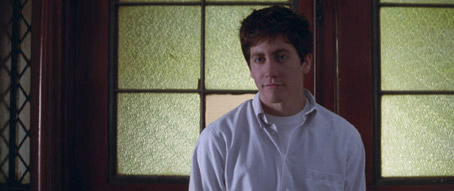
They Made Me Do It Too: The Cult of Donnie Darko (30:17)
Coming from an academic background, I had high hopes for this, but clearly I've watched far too many BFI Q&A sessions, and I was left feeling rather let down. This featurette should actually be subtitled The UK cult of Donnie Darko instead, since this is created for and discusses the fanbase of the film from a UK perspective. Excerpts from the film are interspersed with discussion covering various topics including interpretations of the film, its style, marketing, and that all-important audience. Where it does excel is in its inclusion of such a wide spectrum of contributors, including Xavier Mendik, director of The Cult Film Archive; Tom Grievson; co-owner of Adventure Records, Paul Conroy; former editor of Empire magazine, Colin Kennedy; director Richard Kelly (via telephone) and Donnie Darko fans. In doing so, this actually gives a reasonably a broad picture of the impact of the film and it's place in film culture, even if it's centricity means that's just a small piece in the global fandom puzzle.
However, when it comes down to it – unsurprisingly – this plays out as a mutual appreciation party, albeit nicely crafted one. You could argue of course, that admirers of Kelly's film (and even Kelly himself) have the right to be rather smug, since Donnie Darko isn't the easiest of films to understand, therefore affection for it implies a certain level of engagement (and maybe intelligence) outside of the norm, and it certainly pats the UK audience on the back for the positive response it garnered during it's theatrical run, and in the years since. In fairness, Donnie Darko is a rare case in modern film history, in that it became cult through the embracement of fans, in the classical sense of the term, rather than being sold as cult by a witty marketing man.
The Director's Cut trailer (0:55)
A brief piece made to promote the release of the director's cut of the film in cinemas. This is nicely done, edited at breakneck speed, which makes it very stream-of-consciousness-like. The imagery presented here is so now so iconic, that there's no real need for the hard sell, which is interesting in itself, especially when compared its theatrical cut counterpart on disc one.
Production Diary (52:40)
Of all the extras presented on this release, I found this the most enjoyable. Viewable with optional commentary by director of photography, Stephen Poster, this is filmed on handheld camera and documents the process of location scouting and the shooting of several scenes, segmented by date, with intertitles that countdown how much of the shoot remains, which is a nice touch given the importance of time and lack thereof it within the film itself. Before the piece starts proper, we get the now obligatory title card informing us about the quality of the footage, which is of course a way to negate gripes about poor picture quality on Blu-rays (since the majority of people expect everything presented on them to be as pin-sharp as the feature, no matter its age) but it's also indicative of their desire to please an educated and exacting fanbase in Darko devotees.
Though this is an interesting extra by itself, Poster's commentary really adds to it, since he elaborates on and rounds out what we see on screen. Discussions of the intricacies of filmmaking can sometimes be quite boring if you aren't all that invested, but this one has a distinctly personal touch. Sometimes, I find that that commentary tracks are created for the sake of making them, because they're such a ubiquitous part of the supplemental features experience, but for once, this is really worth its salt, and well worth listening to.
My only bugbear is that the audio track in the original Diary footage remains at the same volume when Poster's commentary is activated, which makes it slightly cacophonous at times, but it's a minor thing, and over the running time, you learn to tune out the original track and listen to the commentary instead. To combat this, it may be a good idea to view it twice, once without Poster's commentary and once with it to get the best enjoyment out of it.
Unlike so many of its contemporaries, Donnie Darko has stood the test of time and writer-director Richard Kelly's mesmerising and multi-faceted debut certainly withstands the scrutiny of repeated views. In fact, it's the kind of film created for exactly that purpose. Though for the Darko/Kelly diehard, there isn't a great deal extra to warrant another purchase. However, if somehow, the film has passed you by completely, then I'd argue that this set is the best option for a first viewing.
|